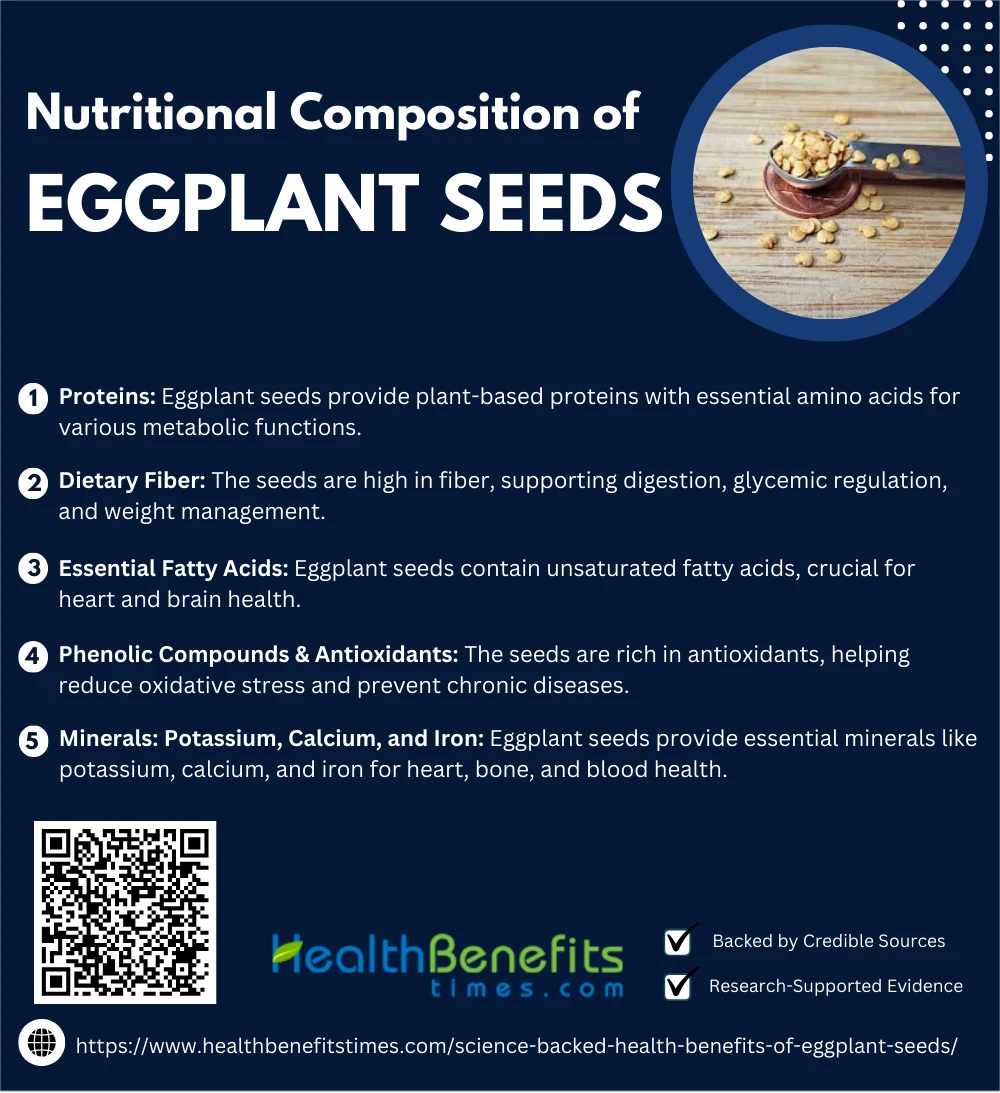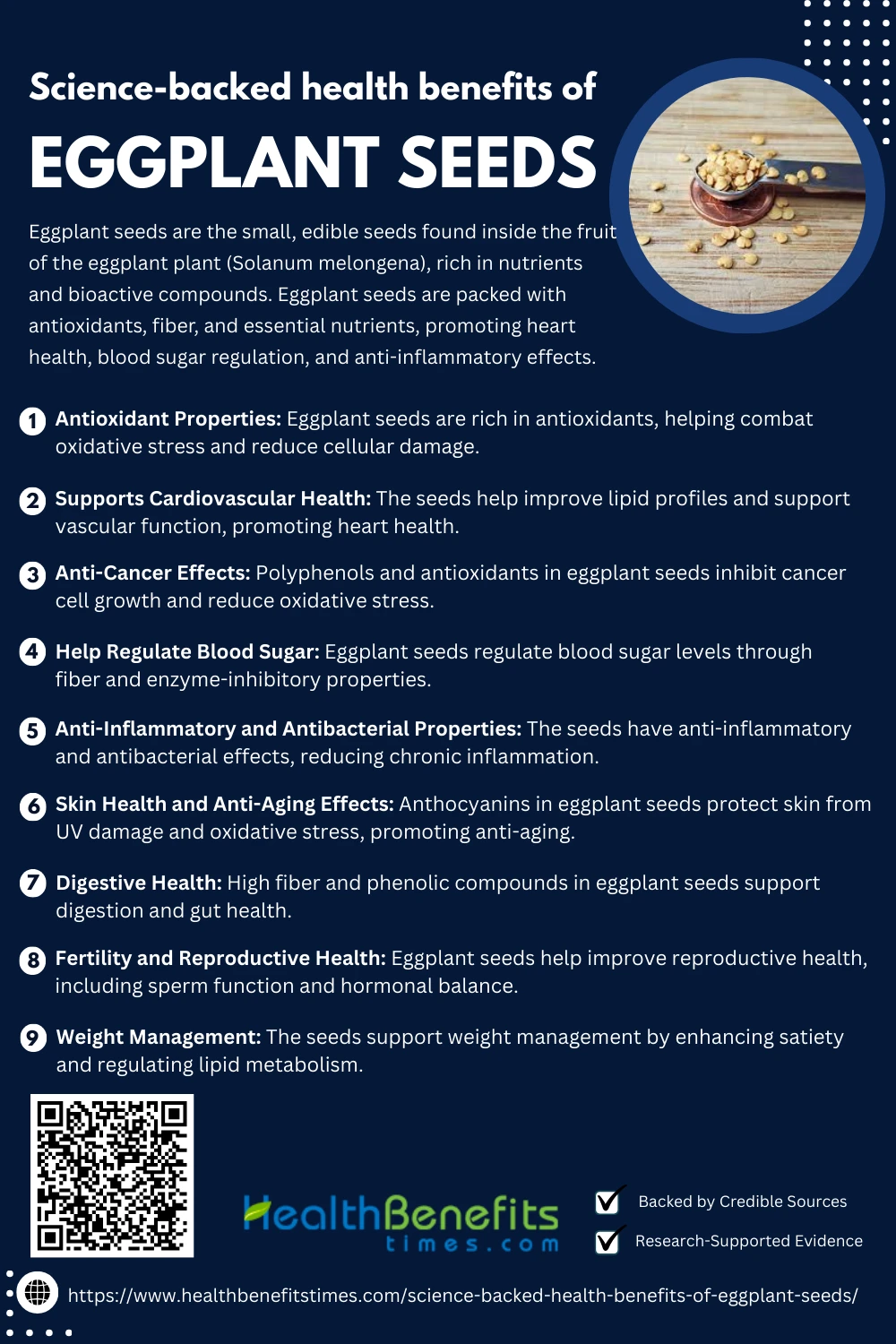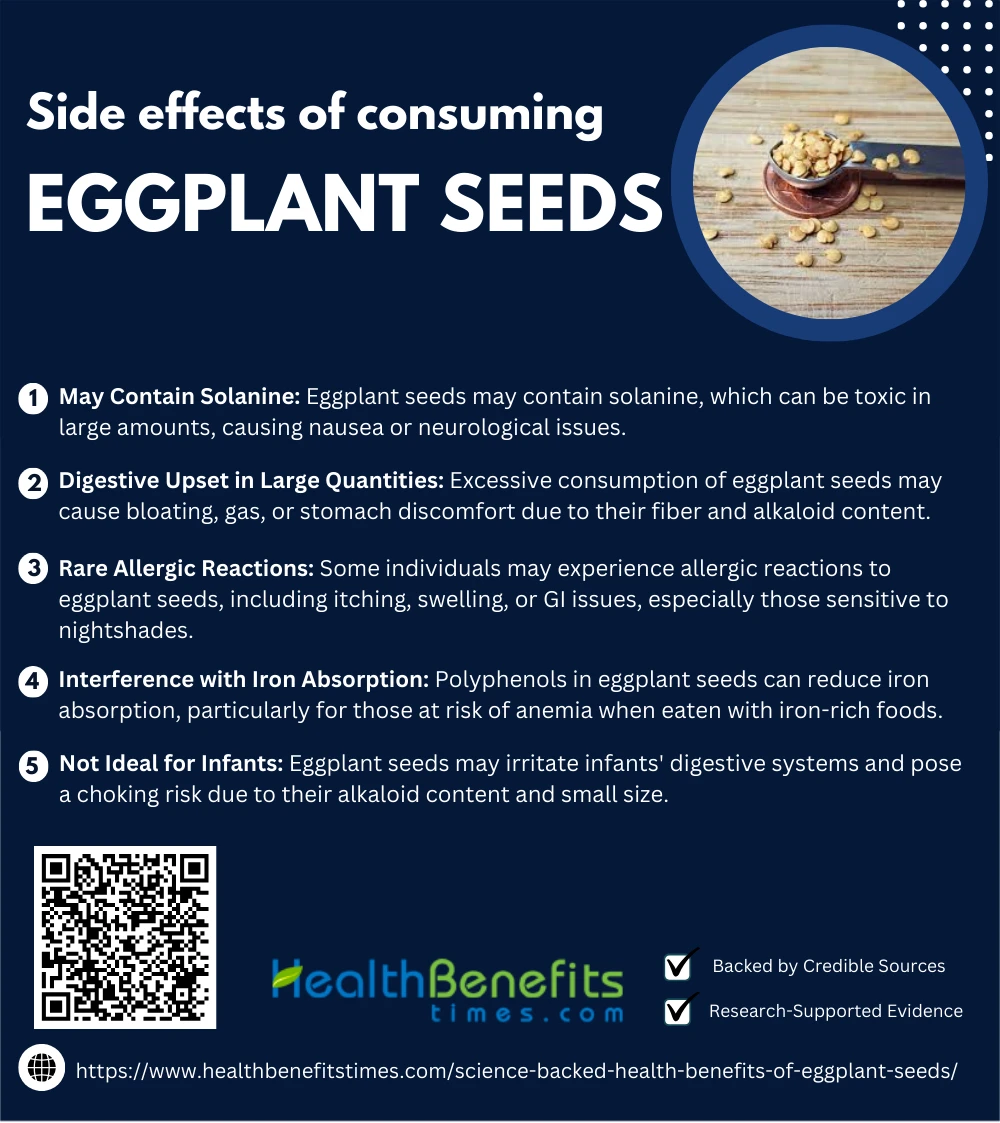- Eggplant seeds are the small, edible seeds found inside the fruit of the eggplant plant (Solanum melongena), rich in nutrients and bioactive compounds.
- Eggplant seeds are packed with antioxidants, fiber, and essential nutrients, promoting heart health, blood sugar regulation, and anti-inflammatory effects.
- Research supports the potential of eggplant seeds in preventing chronic diseases, including cancer, and enhancing overall wellness through their powerful bioactive compounds.
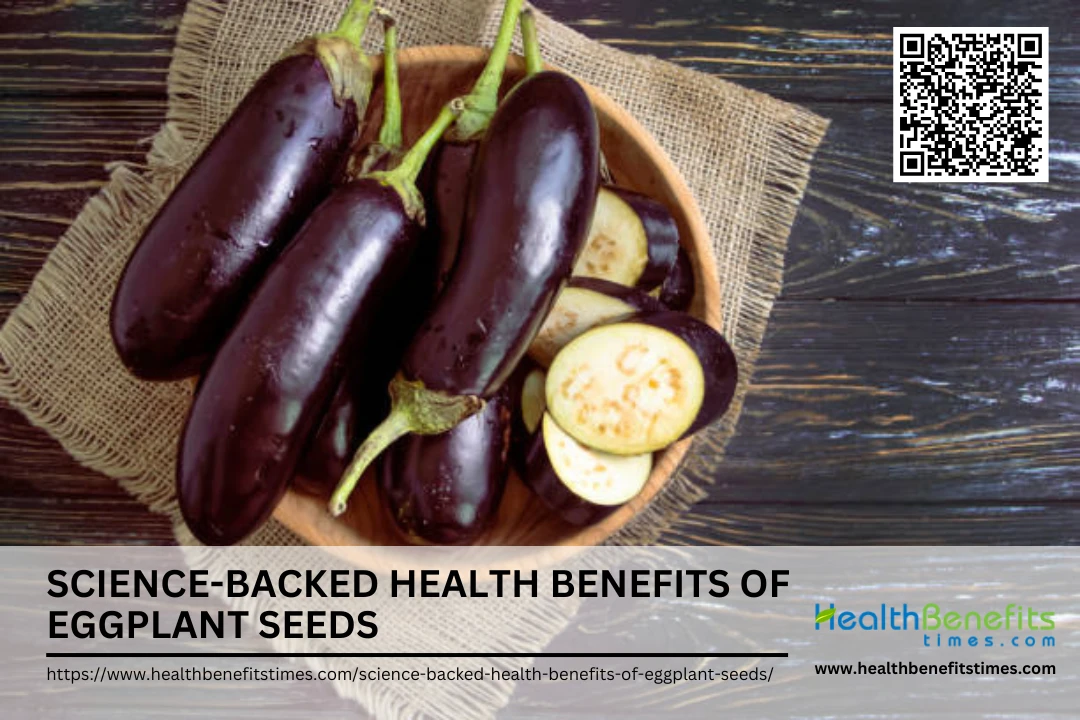 Eggplant seeds are the tiny, nutrient-rich components found inside the fruit of the Solanum melongena plant, commonly known as eggplant or aubergine. These seeds contain bioactive compounds such as flavonoids, phenolic acids, and essential fatty acids that are increasingly recognized for their medicinal and nutritional properties. Eggplant seeds are emerging as a promising nutraceutical ingredient backed by scientific research, primarily due to their rich phytochemical profile. Studies show that these seeds possess antioxidant, anti-inflammatory, and anti-diabetic properties, potentially aiding in the prevention of chronic diseases such as cardiovascular disorders and type 2 diabetes. Their high polyphenol content contributes to the modulation of oxidative stress in the body, a key factor in many degenerative diseases. One study highlighted that polyphenols extracted from eggplant parts, including seeds, demonstrated significant free radical scavenging activity and potential therapeutic use. Additionally, eggplant seeds may play a role in improving soil and crop productivity through organic waste recycling, indirectly supporting food sustainability and health.
Eggplant seeds are the tiny, nutrient-rich components found inside the fruit of the Solanum melongena plant, commonly known as eggplant or aubergine. These seeds contain bioactive compounds such as flavonoids, phenolic acids, and essential fatty acids that are increasingly recognized for their medicinal and nutritional properties. Eggplant seeds are emerging as a promising nutraceutical ingredient backed by scientific research, primarily due to their rich phytochemical profile. Studies show that these seeds possess antioxidant, anti-inflammatory, and anti-diabetic properties, potentially aiding in the prevention of chronic diseases such as cardiovascular disorders and type 2 diabetes. Their high polyphenol content contributes to the modulation of oxidative stress in the body, a key factor in many degenerative diseases. One study highlighted that polyphenols extracted from eggplant parts, including seeds, demonstrated significant free radical scavenging activity and potential therapeutic use. Additionally, eggplant seeds may play a role in improving soil and crop productivity through organic waste recycling, indirectly supporting food sustainability and health.
Nutritional Composition of Eggplant Seeds
Eggplant seeds are a nutritional powerhouse, rich in antioxidants, healthy fats, fiber, vitamins, and minerals. Understanding their composition can highlight their potential health benefits and make them a valuable dietary addition.
Eggplant seeds are a modest but notable source of plant-based protein. These proteins contain essential amino acids which contribute to various metabolic functions, including muscle repair, enzyme formation, and cellular regeneration. One study analyzing seed-based flour blends revealed the amino acid profile of eggplant seeds can enhance the nutritional quality of complementary foods. (1)
2. Dietary Fiber
Eggplant seeds are particularly high in dietary fiber, contributing to digestive health by aiding bowel movement and supporting the gut microbiome. Fiber from these seeds also plays a role in glycemic regulation and cholesterol control. This indigestible component acts as a prebiotic and may help in weight management by promoting satiety. (2)
3. Essential Fatty Acids
The oil in eggplant seeds contains unsaturated fatty acids, particularly linoleic and oleic acids, which are crucial for heart and brain health. These fatty acids are known to lower LDL cholesterol and support anti-inflammatory mechanisms. Although not in large concentrations, their presence contributes to the functional properties of the seed in food and therapeutic applications. (2)
4. Phenolic Compounds & Antioxidants
Eggplant seeds are rich in phenolic acids and flavonoids—compounds known for their antioxidant capabilities. These bioactive components help in scavenging free radicals, thereby reducing oxidative stress and preventing chronic diseases such as cancer and diabetes. The presence of chlorogenic acid and nasunin, both potent antioxidants, has been widely noted in eggplant tissues, including seeds. (1)
5. Minerals: Potassium, Calcium, and Iron
Eggplant seeds are a source of vital minerals such as potassium (supports heart and muscle function), calcium (important for bone health), and iron (essential for oxygen transport in blood). These micronutrients enhance the seed’s role as a nutritionally dense food item, especially when integrated into multi-grain or seed-based flours. (2)
Comparison to other seed types (e.g., sunflower, pumpkin)
| Nutrient/Property | Eggplant Seeds | Sunflower Seeds | Pumpkin Seeds |
| Calories (per 100g) | ~245 kcal (est.) | ~584 kcal | ~559 kcal |
| Protein | ~13–15 g (moderate) | ~20–21 g (high) | ~19 g (high) |
| Total Fat | ~15–18 g (mostly unsaturated) | ~51 g (rich in PUFA & MUFA) | ~49 g (rich in omega-6, some omega-3) |
| Carbohydrates | ~15–20 g (includes fiber) | ~20 g | ~11 g |
| Dietary Fiber | ~7–9 g (supports digestion) | ~8.6 g | ~6.5 g |
| Key Minerals | Potassium, Calcium, Iron | Magnesium, Selenium, Copper, Zinc | Magnesium, Zinc, Iron, Manganese |
| Key Vitamins | Trace Vit C, Vit K (minor) | Vit E, B-complex | Vit E, B2, B3, B9 |
| Phytochemicals | Flavonoids, Phenolic acids (e.g., chlorogenic acid) | Chlorogenic acid, phytosterols | Tocopherols, phytosterols |
| Fatty Acid Profile | Oleic, Linoleic acids (beneficial unsaturated fats) | High linoleic acid (omega-6), some oleic acid | Linoleic, palmitic acids + rare omega-3s |
| Antioxidant Activity | Moderate (polyphenol-based) | High (vitamin E, phenols) | High (tocopherols, carotenoids) |
| Anti-inflammatory Potential | Present (based on phenolic profile) | Strong (linked to phytosterols and unsaturated fats) | Strong (especially for prostate health) |
| Medicinal Uses | Anti-diabetic, cardiovascular, antimicrobial (emerging studies) | Heart health, skin health, immune boosting | Prostate health, anti-parasitic, hormone support |
| Allergen Risk | Low (rare allergies reported) | Moderate (common allergen) | Low to moderate (rare, but possible) |
| Culinary Use | Limited — typically underused; potential as flour or powder additive | Popular snack, oil, butter | Used in granola, baking, smoothies, oil |
| Commercial Availability | Low (not commonly found as a standalone product) | High (widely available in markets) | High (available raw, roas |
Science-Backed Health Benefits of Eggplant Seeds
Eggplant seeds are packed with nutrients and offer numerous health benefits. Backed by scientific research, these seeds support heart health, regulate blood sugar, fight inflammation, and promote overall well-being.
Eggplant seeds are rich in phenolic compounds like chlorogenic acid and flavonoids, which exhibit strong antioxidant activity. These phytochemicals combat oxidative stress and reduce cellular damage by neutralizing free radicals. Research confirms that seed extracts show high polyphenol content and radical scavenging ability, enhancing health protection. (3) Their antioxidant power was also validated in comparative studies on seed-based functional flours. (1) Additional studies support their potential in managing oxidative-linked disorders. (4) (5) (6)
2. Supports Cardiovascular Health
Eggplant seeds are beneficial to heart health due to their content of unsaturated fatty acids and bioactives that reduce blood lipids and support vascular function. In animal models, eggplant seed extracts significantly improved lipid profiles and reduced hyperlipidemia. (7) Their polyphenolic composition may lower LDL oxidation, a key factor in atherosclerosis. (8) Another study highlights the antihyperlipidemic effect of eggplant anthocyanins. (9) Eggplant’s vasorelaxation properties support blood pressure regulation, and additional reviews confirm their cardioprotective profile. (10) (5)
3. Anti-Cancer Effects
Eggplant seeds exhibit promising anti-cancer effects due to their high polyphenolic and antioxidant content. Studies demonstrate that these bioactives inhibit cancer cell proliferation and induce apoptosis in malignant cells. Particularly, nasunin, found in eggplant skin and seeds, shows inhibitory activity against angiogenesis in tumor models. (11) Moreover, Nwanna & Ibukun (2013) confirmed the inhibitory effects on starch enzymes linked to metabolic cancers. (12) Fraikue (2016) emphasized eggplant’s role in controlling cancer-promoting inflammation. (13) Antioxidant-rich phenolics in seeds are shown to reduce oxidative stress, a key cancer risk factor. (14) Finally, Tabibiazar et al. (2023) explored nasunin’s chemopreventive potential in vitro. (6)
4. Help regulate Blood Sugar
Eggplant seeds support blood sugar regulation through high fiber content and enzyme-inhibitory properties. Fraikue (2016) highlighted their low carbohydrate index and role in glycemic control. (13) Nwanna et al. (2013) reported enzyme inhibition effects relevant to type 2 diabetes. (12) Ossamulu et al. (2014) emphasized bioactive compounds in different cultivars that impact glucose metabolism. (15) Tagliazucchi et al. (2022) found seed phenolics improved incretin response. (11) Lastly, Yarmohammadi et al. (2021) discussed metabolic benefits in diabetic models treated with eggplant extracts. (16)
5. Anti-Inflammatory and Antibacterial Properties
Eggplant seeds contain high concentrations of polyphenols and alkaloids that exhibit potent anti-inflammatory and antibacterial activity. These compounds inhibit pro-inflammatory cytokines and reduce oxidative damage, contributing to chronic inflammation prevention. A study by Kour et al. (2023) confirmed antimicrobial action of eggplant waste. (3) Other investigations support antibacterial activity against E. coli and S. aureus. (17) (18) (1)
6. Skin Health and Anti-Aging Effects
Eggplant seeds promote skin health and anti-aging due to their anthocyanin content, especially nasunin, which protects skin from UV damage and oxidative stress. These compounds reduce collagen degradation and improve skin elasticity. A comprehensive review by Lakshmikanthan et al. (2024) emphasizes their dermatological potential. (19) Supporting works highlight eggplant’s protective effects. (20) (21) (11) (18)
7. Digestive Health
Eggplant seeds contribute to digestive health through their high fiber content, promoting intestinal motility and microbial balance. (22) Their phenolic compounds exert anti-inflammatory effects on gut tissues. (23) Research also highlights the seeds’ ability to regulate bile acid metabolism and lipid absorption. (24) Eggplant extracts improve gut enzyme activity, further aiding digestion. (25) Their antioxidants support gut barrier integrity and reduce oxidative stress. (26)
8. Fertility and Reproductive Health
Eggplant seeds, particularly those from Solanum macrocarpon, show promising benefits in reproductive health. Their antioxidant properties reduce oxidative damage to sperm cells and reproductive tissues. (27) Clinical studies on rats revealed that eggplant extract improved ovulation and follicle development. (28) Eggplant seed-derived polyphenols also modulate inflammatory pathways critical for fertility. (29) Their role in restoring hormonal balance has been validated in rodent models. (30) Moreover, dietary eggplant powder enhances reproductive gene expression under oxidative stress. (31)
9. Weight Management
Eggplant seeds may aid in weight management due to their high fiber content, which enhances satiety and regulates appetite. Polyphenols in the seeds help modulate lipid metabolism and fat oxidation. (32) Animal studies also show reduced adipose tissue and improved glucose-lipid balance. (28) Additionally, the seeds reduce leptin resistance, aiding obesity control. (11) These effects are amplified by antioxidants that combat metabolic stress. (33)
How to Incorporate Eggplant Seeds into Your Diet
Incorporating eggplant seeds into your diet is an easy and nutritious way to boost your health. From smoothies to roasted snacks, discover simple methods to enjoy the benefits of eggplant seeds.
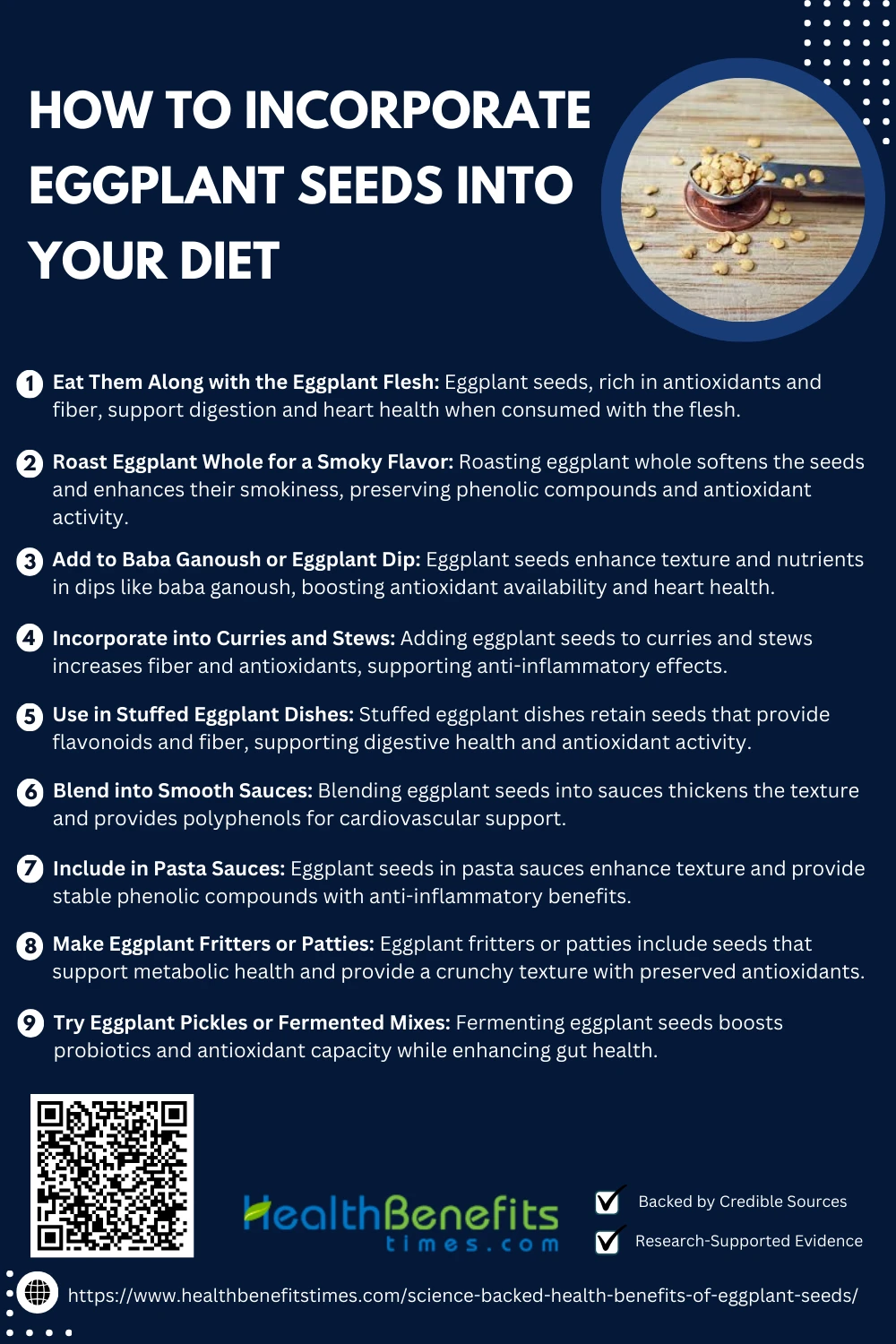 1. Eat Them Along with the Eggplant Flesh
1. Eat Them Along with the Eggplant Flesh
Eggplant seeds are safe and nutritious when consumed with the flesh. They’re rich in antioxidants and dietary fiber, supporting digestion and heart health. (34) Cooking doesn’t diminish their value, and their polyphenols aid inflammation reduction. Eating them whole also ensures maximum phytonutrient intake. (35)
2. Roast Eggplant Whole for a Smoky Flavor
Roasting eggplant whole enhances its natural smokiness while softening the seeds for smooth consumption. This method preserves its phenolic compounds. The skin and seeds become more palatable and nutrient-accessible, and it amplifies antioxidant activity. (36)
3. Add to Baba Ganoush or Eggplant Dip
In baba ganoush, eggplant seeds blend seamlessly, enhancing texture and nutrient content. These seeds contribute phenolic compounds that support oxidative balance. (37) Roasting with seeds improves antioxidant availability, while traditional Mediterranean dips preserve polyphenols critical for heart health.
4. Incorporate into Curries and Stews
Eggplant seeds soften beautifully in simmered dishes, adding fiber and a nutty depth to curries and stews. Their inclusion boosts the dish’s phenolic load, which supports anti-inflammatory effects. (38) Cooking in spices may enhance nutrient absorption, making them ideal for flavorful meals.
5. Use in Stuffed Eggplant Dishes
Stuffed eggplant recipes retain all parts of the vegetable, including nutrient-rich seeds. These seeds contain flavonoids and fiber that support digestive health. (39) Cooking them intact helps preserve antioxidant activity, and their slight bitterness complements rich fillings.
6. Blend into Smooth Sauces
Eggplant seeds blend effortlessly into sauces, enhancing thickness and delivering bioactive compounds. Their polyphenols contribute to cardiovascular support. Blending cooked seeds breaks down cell walls for improved nutrient access, and they’re especially effective in Mediterranean-style preparations.
7. Include in Pasta Sauces
Eggplant seeds integrate well into pasta sauces, enriching texture and nutrition. Their phenolic compounds remain stable during cooking, contributing to anti-inflammatory benefits. When simmered, seeds break down naturally, boosting fiber and micronutrient intake, making them a wholesome addition to traditional tomato sauces. (40)
8. Make Eggplant Fritters or Patties
Eggplant fritters or patties offer a tasty way to use the entire vegetable, including the seeds. These seeds contain essential bioactives that support metabolic health. Frying or baking enhances flavor while preserving antioxidants, and their crunch improves texture (Taylor & Francis). (41)
9. Try Eggplant Pickles or Fermented Mixes
Fermenting eggplant seeds enhances probiotic benefits and preserves bioactives like phenolic acids. The fermentation process may increase antioxidant capacity, while traditional pickling retains essential minerals and flavor profiles. This method adds tang and boosts gut health. (42)
Side effects of consuming Eggplant seeds
While eggplant seeds offer various health benefits, consuming them in excess can lead to certain side effects. It’s important to be aware of potential risks like digestive issues, allergies, and nutrient interference.
Eggplant seeds, like other nightshade parts, may contain trace amounts of solanine, a glycoalkaloid with toxic potential at high doses. (43) Solanine is known to disrupt cellular membranes and may cause nausea or neurological symptoms in large quantities. (44)
2. Digestive Upset in Large Quantities
When consumed in excess, eggplant seeds’ fiber and alkaloid content may lead to bloating, gas, or mild stomach discomfort. Their saponins can irritate mucosal linings in sensitive individuals, and overcooking may amplify bitterness that disrupts digestion.
3. Rare Allergic Reactions
Though uncommon, some individuals may experience allergic reactions to eggplant seeds, especially those with nightshade sensitivities. Symptoms can include itching, swelling, or GI upset. Cross-reactivity with birch or grass pollen is documented, and eggplant allergy is underrecognized in clinical diagnosis. (45)
4. Interference with Iron Absorption
Polyphenols in eggplant seeds can chelate non-heme iron, reducing absorption — especially when consumed with iron-rich plant foods. This effect is significant for individuals at risk of anemia. (46) The astringency from phenolics also contributes to iron-binding effects.
5. Not Ideal for Infants
Eggplant seeds may be unsuitable for infants due to their alkaloid content, which could irritate sensitive digestive systems. (47) Their small size also poses a mild choking risk for babies under 12 months. (48) Additionally, phenolics may interfere with nutrient absorption during early development.
Conclusion
In conclusion, eggplant seeds offer a range of impressive science-backed health benefits. From their powerful antioxidant properties that fight free radicals to their ability to promote cardiovascular health and regulate blood sugar levels, these seeds are a valuable addition to a balanced diet. Their anti-inflammatory, antibacterial, and anti-aging effects further contribute to overall well-being, while the high fiber content supports digestive health and weight management. Incorporating eggplant seeds into your daily meals can provide numerous health benefits, making them a simple yet effective way to enhance your nutrition and overall wellness.


